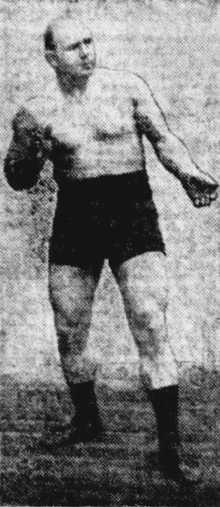Joe Bailey (wrestler)
Joe Bailey (c. 1886 - 28 January 1951) was an Australian professional wrestler most notable for losing to Billy Meeske in a match to determine the Australian Heavyweight Championship in 1922. He was also an all-round sportsman competing in football, amateur wrestling, and competitive cycling.[1]

Biography
Bailey was an amateur wrestler before taking up professional wrestling,[2] beginning his career by asking to be trained at Fred Porter's gymnasium and impressing with his ability to lift weights.[3] He was a respected heavyweight as of 1913,[4] and was Australian amateur heavyweight champion by 1914.[5] He continued wrestling during the First World War, beating a J. McKenna in a bout at the Railway Institute in Melbourne in 1917.[6] In 1918 he helped organize an Athletics Programme in Melbourne as part of a Police Charity Carnival.[7]
In 1920 Bailey was one of two wrestlers to be able to throw Australian Olympic prospect Roy Jenkin during his training at the Victorian Railways Institute,[8] although he lost to him in the Ballarat Championship later in the year.[9] As of 1921 Bailey had begun training boxers.[10]
As of 1922 professional wrestling had almost ceased to exist in Australia since the First World War and the company Country Stadiums Ltd. aimed to re-establish it.[11] The professional wrestling Heavyweight Championship had been vacated when Clarence Weber retired in 1913, and in August a meeting of Victorian professional wrestlers was held at which it was determined that Joe Bailey and Billy Meeske had the best claims to be heavyweight champion and a match between them was scheduled.[12] Meeske promoted the fight by antagonizing Bailey by publicly wagering money and suggesting that Bailey may not show due to cowardice.[13] They wrestled for the heavyweight championship on November 22 at Melbourne Stadium,[14] and Bailey lost leading to Meeske becoming champion.[15]
Bailey did not consider returning to the ring until July 1923 when he began training again, however no match was scheduled.[16] In 1927 he announced he was willing to wrestle any heavyweight in Melbourne,[17] and in October 1927 he refereed a match between Ted Thye and Walter Miller in Launceston.[18] In 1928 a Launceston promoter offered to book him,[19] with Sam Burmeister agreeing to wrestle him in Launceston in May, although it is not clear if the match ultimately took place.[20]
As of 1930 Bailey had begun coaching boxers in Melbourne,[21] and he coached boxing and amateur wrestling up until a few months before his passing.[22]
References
- "Joe Bailey Passes On". Sporting Globe. Melbourne, Vic. 31 January 1951. p. 16. Retrieved 22 June 2020.
- "Boxing". Sporting Judge. Melbourne, Vic. 5 December 1914. p. 1. Retrieved 22 June 2020.
- "Steam Roller Wanted". Sporting Globe. Melbourne, Vic. 9 September 1922. p. 4. Retrieved 22 June 2020.
- "Pavilion Contests". Weekly Times. Melbourne, Vic. 11 January 1913. p. 25. Retrieved 22 June 2020.
- "Classified Advertising". The Argus. Melbourne, Vic. 20 October 1916. p. 12. Retrieved 22 June 2020.
- "Boxing". Sporting Judge. Melbourne, Vic. 30 June 1917. p. 3. Retrieved 22 June 2020.
- "Classified Advertsing". The Argus. Melbourne, Vic. 25 October 1919. p. 12. Retrieved 22 June 2020.
- "Should Victoria Send Four Men to the Olympic Games". The Herald. Melbourne, Vic. 26 March 1920. p. 3. Retrieved 22 June 2020.
- "About Your Home". Advocate. Melbourne, Vic. 24 June 1920. p. 22. Retrieved 22 June 2020.
- "Boxers in Making". The Herald. Melbourne, Vic. 30 April 1921. p. 3. Retrieved 22 June 2020.
- "Professional Wrestling". The Herald. Melbourne, Vic. 26 January 1922. p. 3. Retrieved 17 June 2020.
- "Wrestlers Active". Sporting Globe. Melbourne, Vic. 23 August 1922. p. 14. Retrieved 17 June 2020.
- "Wrestlers at Loggerheads". Sporting Globe. Melbourne, Vic. 13 September 1922. p. 15. Retrieved 17 June 2020.
- "Boxing and Wrestling: Events at Stadium". The Herald. Melbourne, Vic. 21 November 1922. p. 2. Retrieved 17 June 2020.
- "Stadium Wrestling: Meeske's Clear-Cut Victory". The Herald. Melbourne, Vic. 23 November 1922. p. 2. Retrieved 17 June 2020.
- "Bailey's Plans". Sporting Globe. Melbourne, Vic. 11 July 1923. p. 10. Retrieved 17 June 2020.
- "Rough Wrestling". Sporting Globe. Melbourne, Vic. 19 October 1927. p. 10. Retrieved 17 June 2020.
- "Wrestlers for Launceston". Daily Telegraph. Launceston, Tas. 1 October 1927. p. 27. Retrieved 17 June 2020.
- "Offer to Bailey". Sporting Globe. Melbourne, Vic. 25 April 1928. p. 11. Retrieved 17 June 2020.
- "Burmeister Accepts". Sporting Globe. Melbourne, Vic. 9 May 1928. p. 7. Retrieved 17 June 2020.
- "Advertising". The Age. Melbourne, Vic. 13 December 1930. p. 24. Retrieved 17 June 2020.
- "Joe Bailey Passes On". Sporting Globe. Melbourne, Vic. 31 January 1951. p. 16. Retrieved 22 June 2020.